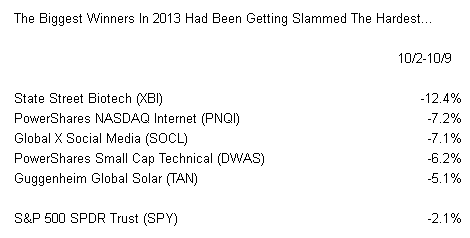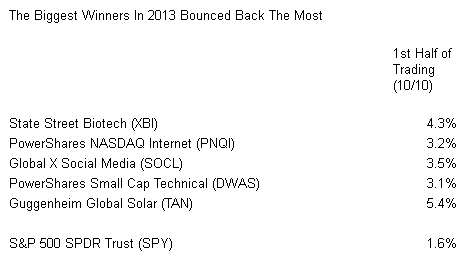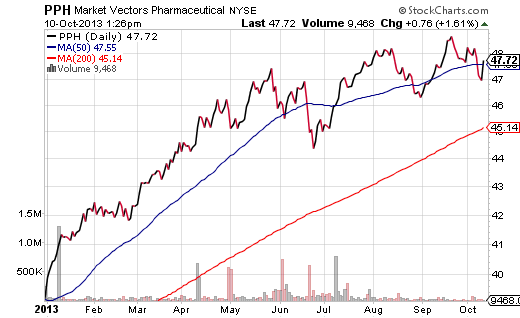In my previous article, “What Apple Can Teach ETF Investors About Performance Chasing,” I addressed a familiar market phenomenon. Specifically, the larger the momentum-based price appreciation, the more pronounced the fall from grace. There is also a tendency for the opposite to hold true. In fact, the essence of value-based investing is to acquire massively beaten down shares of “good companies” and allow for the inevitable recovery of sanity.
Right now, though, most do not care as much about the dominant theme that transfixes markets at a given point in time. Few non-professional investors care whether it is the greed of performance chasing that is succeeding or the “buy fear” approach that value-oriented money managers use to profit. Most just want to know what works today.
I provided a glimpse of the probable answer in the aforementioned column. I wrote:
“Assuming the government gets its act together (enough so that there are no more cliffs/crises/showdowns in 2013), pay extra close attention to the best performing sectors. If they are the same groups (e.g., biotech, “new tech,” small-cap growth, etc.,), you’ll know that the investment community returned to momentum-based performance chasing. In contrast, if the hottest areas struggle in spite of a debt agreement, a rotation into “risk-sort-of-on” assets might be transpiring.”
The market activity following a proposal to raise the debt ceiling for six weeks — a proposition that is meant to buy time for a larger and more substantive agreement on both the budget as well as borrowing limitations — demonstrated that momentum-based investing is still the most popular. Specifically, the previous 5 days witnessed an exodus from many of the biggest price appreciators of 2013:
Then leaders in the U.S. Congress along with the White House showed signs that they “might” be able to negotiate a six-week agreement. Six weeks to squabble some more! Rather than look at circumstances as a continuation of uncertainty, stocks rocketed the most in a single day than they had on nearly any other during the year. Equally worth of note, investors did not rotate into slightly less risky holdings; rather, they coveted the riskiest momentum gainers once more.
Simply stated, the dynamics do not appear to be changing. Earnings growth, revenue and the economy as a whole have not particularly mattered in 2013. Instead, there is a generalized belief that the Fed (and now Yellen) will prevent most threats from derailing “progress.” Tapering or no tapering, rates will remain low enough to benefit American consumers, U.S. businesses, multinationals and foreign entities. And that means, short of U.S. leadership posturing and/or systemic shocks abroad, aggressive U.S. equity investing may see few hiccups in the short- to intermediate-term.
Nevertheless, my primary mandate as the president of my Registered Investment Adviser is to reduce risk while simultaneously pursuing annualized returns that are consistent with client goals. Therefore, I do not get overly “wowed” by the flood of social media IPOs or the promise of the monster biotech boom. Instead, I seek reasonable risk-reward profit in those assets that may benefit from larger themes.
Is it fair to say that “old tech” benefits from “new tech” superstar growth? Then one should consider First Trust NASDAQ Technology Dividend (TDIV) with its attractive 2.6% yield, enormous cash on the collective books as well as attractive P/E ratio.
If the creation of a new drug and its approval can double the biotech company’s share price overnight, if investing in the producers of life altering medications is a speculative way to go after the aging population, is it reasonable to assume that “Big Pharma” will perform without as much speculation? I think so. Consider Market Vectors Pharmaceuticals (PPH) as a potential holding for your portfolio. 
Disclosure: Gary Gordon, MS, CFP is the president of Pacific Park Financial, Inc., a Registered Investment Adviser with the SEC. Gary Gordon, Pacific Park Financial, Inc, and/or its clients may hold positions in the ETFs, mutual funds, and/or any investment asset mentioned above. The commentary does not constitute individualized investment advice. The opinions offered herein are not personalized recommendations to buy, sell or hold securities. At times, issuers of exchange-traded products compensate Pacific Park Financial, Inc. or its subsidiaries for advertising at the ETF Expert web site. ETF Expert content is created independently of any advertising relationships.
- English (UK)
- English (India)
- English (Canada)
- English (Australia)
- English (South Africa)
- English (Philippines)
- English (Nigeria)
- Deutsch
- Español (España)
- Español (México)
- Français
- Italiano
- Nederlands
- Português (Portugal)
- Polski
- Português (Brasil)
- Русский
- Türkçe
- العربية
- Ελληνικά
- Svenska
- Suomi
- עברית
- 日本語
- 한국어
- 简体中文
- 繁體中文
- Bahasa Indonesia
- Bahasa Melayu
- ไทย
- Tiếng Việt
- हिंदी
Absence Of Rotation Means Momentum ETFs Still In Charge
Published 10/11/2013, 02:45 AM
Updated 03/09/2019, 08:30 AM
Absence Of Rotation Means Momentum ETFs Still In Charge
Latest comments
Loading next article…
Install Our App
Risk Disclosure: Trading in financial instruments and/or cryptocurrencies involves high risks including the risk of losing some, or all, of your investment amount, and may not be suitable for all investors. Prices of cryptocurrencies are extremely volatile and may be affected by external factors such as financial, regulatory or political events. Trading on margin increases the financial risks.
Before deciding to trade in financial instrument or cryptocurrencies you should be fully informed of the risks and costs associated with trading the financial markets, carefully consider your investment objectives, level of experience, and risk appetite, and seek professional advice where needed.
Fusion Media would like to remind you that the data contained in this website is not necessarily real-time nor accurate. The data and prices on the website are not necessarily provided by any market or exchange, but may be provided by market makers, and so prices may not be accurate and may differ from the actual price at any given market, meaning prices are indicative and not appropriate for trading purposes. Fusion Media and any provider of the data contained in this website will not accept liability for any loss or damage as a result of your trading, or your reliance on the information contained within this website.
It is prohibited to use, store, reproduce, display, modify, transmit or distribute the data contained in this website without the explicit prior written permission of Fusion Media and/or the data provider. All intellectual property rights are reserved by the providers and/or the exchange providing the data contained in this website.
Fusion Media may be compensated by the advertisers that appear on the website, based on your interaction with the advertisements or advertisers.
Before deciding to trade in financial instrument or cryptocurrencies you should be fully informed of the risks and costs associated with trading the financial markets, carefully consider your investment objectives, level of experience, and risk appetite, and seek professional advice where needed.
Fusion Media would like to remind you that the data contained in this website is not necessarily real-time nor accurate. The data and prices on the website are not necessarily provided by any market or exchange, but may be provided by market makers, and so prices may not be accurate and may differ from the actual price at any given market, meaning prices are indicative and not appropriate for trading purposes. Fusion Media and any provider of the data contained in this website will not accept liability for any loss or damage as a result of your trading, or your reliance on the information contained within this website.
It is prohibited to use, store, reproduce, display, modify, transmit or distribute the data contained in this website without the explicit prior written permission of Fusion Media and/or the data provider. All intellectual property rights are reserved by the providers and/or the exchange providing the data contained in this website.
Fusion Media may be compensated by the advertisers that appear on the website, based on your interaction with the advertisements or advertisers.
© 2007-2025 - Fusion Media Limited. All Rights Reserved.
